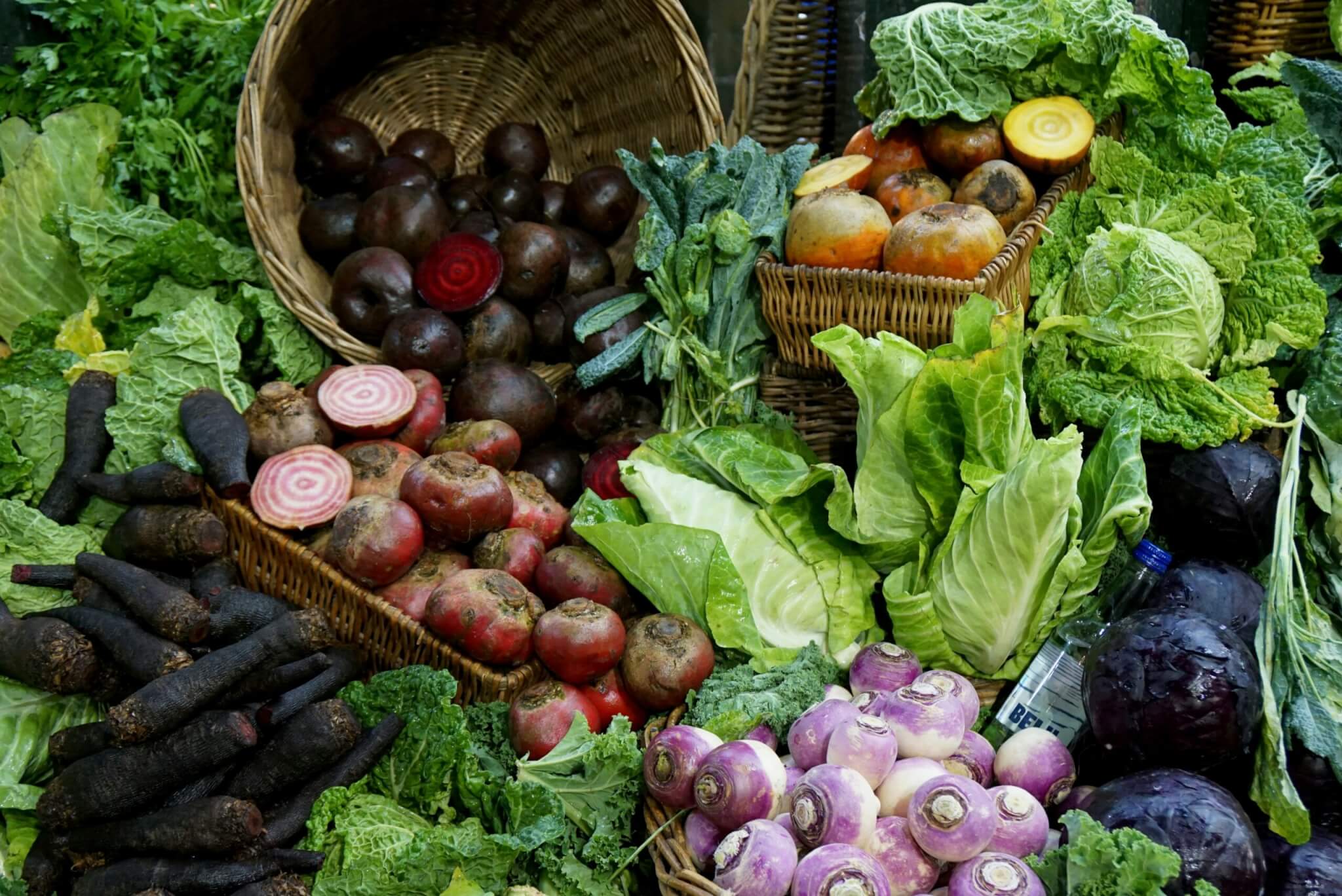Campaigners are threatening the government with legal action over the failure to tackle meat and dairy consumption in its recent food strategy.
The environmental group Feedback has written to the government to ask how they will reach legally binding emissions targets without reducing how much meat and dairy is eaten and produced in the UK.
Both Henry Dimbleby’s food strategy and the Climate Change Committee (CCC), an independent government body advising on climate change, recommended 20 and 30 per cent reductions respectively of animal products in diets to meet net zero emissions (where the amount of greenhouse gases we emit is equalled by the amount we remove) by 2050.
Meanwhile, Defra minister George Eustice said in a Lord’s Select Committee on climate change that the government has “no intention of telling people to eat less meat”. Instead, the government’s food strategy states that new technology, such as feed additives, will be developed to help reduce emissions.
“By failing to take any action whatsoever to support the reduction of meat and dairy, against the advice of Henry Dimbleby and the Committee on Climate Change, the government is committing to vast agricultural emissions and land use from livestock,” said executive director of Feedback, Carina Millstone.
Feedback said this could be illegal because the government has committed by law, under the Climate Change Act, to reach net zero emissions by 2050 and it is unclear how they will achieve them without reductions in meat and dairy.
More on the food strategy
- Food strategy; another casualty of dysfunctional politics
- Johnson’s food strategy slammed as ‘feeble’
- The rationale of rations
How much meat to eat and whether to reduce is a topic of debate elsewhere, as a new report by the Sustainable Food Trust recently set out its own plan for climate-friendly food systems and where it stresses that a differentiation in how the livestock is reared is vital.
“The government claims it has produced a strategy to tackle the contribution food makes to the climate emergency but has omitted from it any policies on meat or dairy reduction, despite clear recommendations,” said Feedback’s legal representative, Rowan Smith.
“On the face of it, that error is potentially unlawful,” Smith added.
This comes as the government’s climate strategy has also been ruled unlawful in a landmark case in the high court and will be forced to revise its strategy as a result. It comes in a week of record high temperatures and severe heat across the UK with mass disruption across the railway as infrastructure failed to cope.
Environmental charities, Friends of the Earth, Client Earth and legal campaign group, Good Law Project, won a successful legal challenge against the government proving that its current policies to limit carbon emissions are inadequate to meet the reductions required by the Climate Change Act.
The policies set out in the climate strategy were calculated to be five per cent short of the targets. However, according to analysis by the CCC, the government have credible plans for only 39 per cent of the legal reductions.
“This decision is a breakthrough moment in the fight against climate delay and inaction. It forces the government to put in place climate plans that will actually address the crisis,” said senior lawyer at Client Earth, Sam Hunter Jones.
According to Millstone, this bodes well for Feedback’s legal challenge to the government on meat and dairy consumption, to which the government will respond by the 5 August.
“It relies on the same legal argument,” said Millstone. “The government has a responsibility under the Climate Change Act to put in the policies to meet their carbon budget.”
“The argument we’re making is that they’ve put in place no policies to reduce meat and dairy consumption, as per the budget.”
Are you reducing how much meat you’re eating? Let us know why in the comments.












I wonder how this can be achieved without slaughtering the cattle, as the Danish government proposes.
I went vegetarian several years ago & my husband only eats meat if we have a meal out. We have also cut down on the milk we use, buying plant milks for use with breakfast cereals & cooking. If everyone did this though, the farmers would be keeping animals that aren’t bringing in an income. What’s the answer?
Surely the answer is to have a phased transition? Also, I believe Dimbleby’s targets of 30% reduction in meat and dairy is to do with consumption, rather than production. If consumption came down and there was a reduced market, farmers would quickly find something else to do. They’re finely atuned to the economics and wouldn’t waste time rearing so many animals if there was less demand.
We still eat meat. We are fortunate to be able to source local, rare breed, regeneratively grazed meat. Ruminant animals are part of the solution, not the problem. They create complete proteins from grass while sequestering carbon and nourishing the fundamentally important soil. Ruminants do not create carbon, but are part of a natural carbon cycle. What if humans were to stop flying? Many just hop on a plane without a second thought. We no longer fly.
I think that’s exactly the sort of meat that Henry Dimbleby would recommend, that ‘less but better’ philosophy. But this local regeneratively grazed meat is a very small minority of the meat that is consumed in the UK. We eat 1.1 billion chickens every year in the UK, and this is on the up. These are housed in intensive conditions, live for 25 days and are fed on soy that could very well be from deforested areas in Brazil and beyond. This is the sort of meat we need to urgently reduce.
All meat is not the same.
I wonder how effective is a court judgement against the government. If they don’t like it they can delay a response, not recognise the court, argue that it wouldn’t be good for the economy, … and do very little to change things.
I haven’t eaten meat or drunk cow’s milk for several years. Having a basic distaste for cultivating animals for food I found switching to alternative meat substitutes and plant milk easy. Incidentally, I think plant butter works better than real butter in shortbreads.
So Friends of the Earth have recently won a court case against the government because their planned climate policies don’t add up to net zero by 2050. Now the government will have to redo their climate strategy so that it does add up. I think it’s because the climate change act, the law that binds the gov to net zero targets, has been described as a serious piece of legislation that can really hold the gov to account.
I think Feedback the charity organising the legal challenge over meat reductions would be thirlled if the gov had to redo the food strategy to account for the meat and dairy emissions.
It is extremely disappointing that both Henry Dimbleby and they CCC have adopted such a simplistic approach to tackling the climate change catastrophe which ignores the sound science relating to global heating that clearly states THE primary cause is mankind’s burning and use of fossil fuels. Check out the Met office, NASA, NOAA websites – The leading bodies on atmospheric science.
A more science based and balanced take on meat and dairy and the role of livestock can be found here
https://www.pastureforlife.org/media/2019/06/Pasture-for-Life-Global-Warming-Solution-Paper-FINAL-at-17-June-2019.pdf
Is it simplistic? According to Dimbleby’s plan the would reduce mainly chicken and pork production (and consumption importantly) that relies on imported grains but would see an increase in extensively reared sheep and cattle. I believe meat production can be part of the solution, but not as it is currently. The status quo cannot go on.
Jack Thompson, I agree, but the ideas around regeneration, such as mob grazing, seem to be on the increase. On the topic of chicken production, as you say, much is produced in Brazil but also Thailand and Poland. In my experience, most shoppers are more concerned with price than provenance. Sadly, chicken does not have the nutritional ‘clout’ of beef and lamb either.
Regenerative farming is certainly having a moment, but where can you buy regenerative food? Still seems unclear.
Agree with you on chicken, even the vast majority of the birds reared here are in intensive systems fed with soy that drives destructive farming abroad and deforestation.
I think the point about meat is so much more than emissions, it’s about pollution and biodiversity loss too. We could all stop flying but food production uses the most land and is the number one cause of habitat loss and deforestation. Look what’s happened to the river Wye. Agreed that we should also reduce our air miles and travelling but we can’t carry on with the current food system.
What has happened on the river Wye is shocking and example of how a giant business can run roughshod over the environment and community. In UK, roughly 60% of farm land is marginal and only suitable for growing grass. The best way to utilise this for human nutrition is to graze ruminants who can process grass into top quality protein which is nutrient rich. If you have the budget, there are farmers and other businesses selling regeneratively grazed meat on line. Swaledale Butchers in Skipton is one example and there are plenty of others online. We are fairly rural, so I am able to buy direct from a couple of local farms. I think Dimbleby’s plan has a lot of merit.